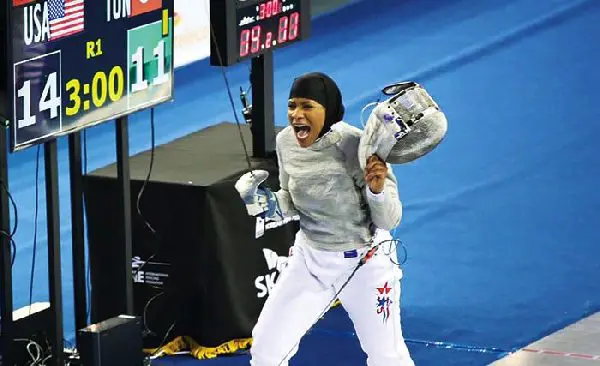
|
| Ibtihaj Muhammad |
“I told her to bring home the gold,” President Obama told the crowd during his first visit to a mosque in Baltimore last month.
He was talking about hijabi fencer Ibtihaj Muhammad, who will represent the United States in Rio De Janeiro this summer, becoming the first American Muslim to compete in the Olympics.
Muhammad ‘s path to becoming the subject of international headlines and being recognized by the president was not easy. She had to overcome many obstacles throughout her journey.
The story of the African American fencing champion from New Jersey has become an inspiration for Muslims, other minorities and athletes worldwide.
However, as she endures strenuous training leading up to the big tournament in August, she said bringing home the gold is far from her only goal. Mohammad, 30, has positioned herself in the forefront of combating the rising Islamophobia. She wants to pave the way to success for athletes from ethnic and religious minorities.
“My athletic goal has always been to qualify for an Olympic game,” Muhammad told The Arab American News. “I feel that by qualifying, I’m challenging the norm of what people think an Olympic athlete looks like and what people think an American athlete looks like, hopefully providing an image for minority youth to be themselves.”
Muhammad, who started wearing the hijab at 12-years-old, said her struggles and hunger for success began in gym class where parents would often glare or comment on her skin color or her scarf.
Being different never bothered her. She said her parents raised her to be confident and to represent Islam in a positive light. She added that being a representative of her religion has always driven the way she conducts herself.
“It always baffled me that others took issue with my skin color or with my faith because I was always really comfortable,” Muhammad said. She added that such bigotry can be uncomfortable and traumatizing for some children.
Muhammad ‘s experiences led her to make the decision that she wanted to change the perception people had about Muslim women and minorities in fencing.
“I am here to not just be a strong representative of our country as an athlete,” Muhammad said. “But also to speak the truth about what the realities are in this country and to hopefully inspire change and provide an opening for there to be more discourse about it.”
Although Muhammad does not necessarily enjoy being under the media’s spotlight, she said she is proud to be part of the change society desperately needs.
As a young athlete, Muhammad said it was hard for her to find role models in the sport because there weren’t any fencers who look like her.
But after joining a fencing foundation, she witnessed African Americans who excelled in the sport, which she found empowering.
“If you have people who have done it before you, it makes it a lot easier for you to see yourself in that space,” Muhammad said.
She said she now finds inspiration in many people, but named her mother as the catalyst for her achievements and her own spirituality for being relentless.
In 2012, Muhammad did not qualify for the Olympics. She said it would have been easy for her to give up fencing then.
She added that as a Muslim, she believed in determinism and refused to give up.
And the secret to championship? It’s staying true to yourself, according to Muhammad.
She recalled a time when she was criticized by her friends for pursuing fencing. She said they called the sport “dorky.” However, she said she set up small goals for herself and she fences for nobody’s satisfaction but her own.
Muhammad urged young boys and girls to create their own paths and embrace being different.
Although elite or collegiate sports aren’t for everyone, Muhammad criticized Muslims who abide by a double-standard for pushing boys to participate in sports, but condemn girls for wanting to do the same.
She called on Muslims to remember the tenants of their faith, to take care of their bodies and introduce physical activity at a young age.






Leave a Reply